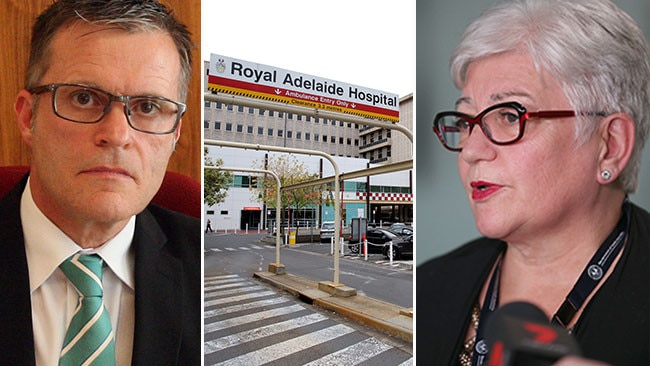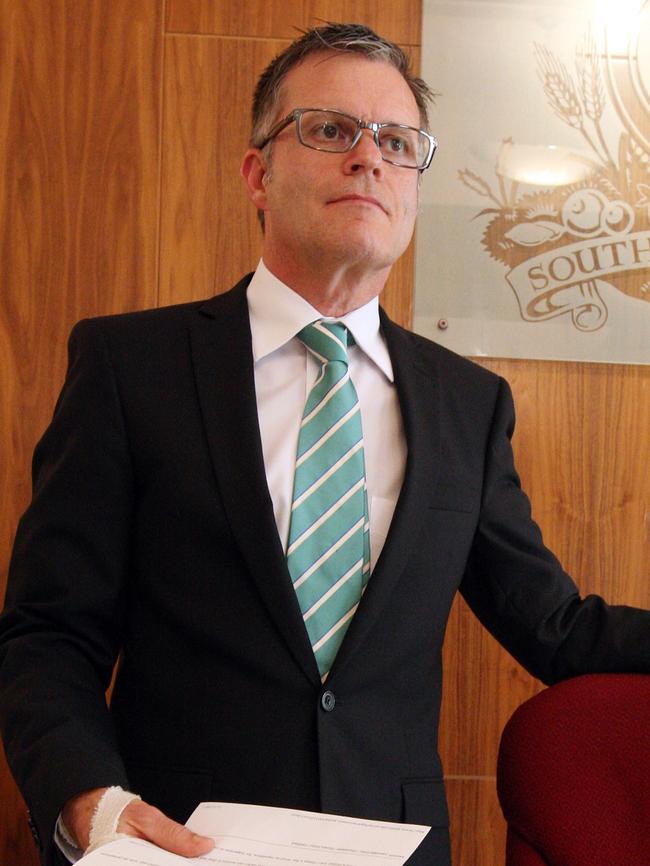State Coroner Mark Johns blasts SA Health over RAH stroke deaths scandals
STATE Coroner Mark Johns has blasted SA Health’s “lack of transparency” and accused it of misleading the public over the stroke deaths rostering scandal at the Royal Adelaide Hospital.

SA News
Don't miss out on the headlines from SA News. Followed categories will be added to My News.
- How The Advertiser revealed the stroke deaths scandal
- The same rostering blunder was set to be repeated in July
- Transforming Health explained: What the reforms involve
- RAH currently overflowing with ‘extraordinary’ 800 patients
STATE Coroner Mark Johns has blasted SA Health over the stroke deaths rostering scandal at the Royal Adelaide Hospital, warning their slackness in reporting to him means autopsies are now unlikely and he may not be able to hold inquests into the two cases.
SA Health’s failure to mention the unavailability of neurointerventionist radiologists in the first death in their report to him means it is now too late to perform an autopsy — which he probably would have ordered — and to direct police to take statements.
Mr Johns said SA Health also failed to notify his office of the second death on the same day, which means an autopsy in that case is now also unlikely.
He has demanded the RAH hand over notes on the second death, which he expects to receive today.
“Again, this is a case in which it is almost certainly now too late to direct an autopsy, and to pursue other initial lines of inquiry,” Mr Johns said.
Mr Johns’ main source of information about the scandal has come from The Advertiser, which exclusively revealed the situation.
SA Health has now released a statement saying under the Coroners Act, it is the obligation of a medical practitioner reporting a death to the Coroner to provide his or her opinion of the cause of death.
“It is not for SA Health to intervene in their clinical opinion,” the statement says. “We’ll continue to work with the Coroner’s Office about the information they require in cases such as these going forward.”
Last Saturday, The Advertiser exposed the deaths of two patients who arrived separately at the RAH on April 18 suffering strokes requiring clot retrieval from the brain — and that the RAH’s only two neurointerventionists qualified to do the procedure were both rostered on leave at the same time.
Officials managed to contact the only other specialist in the state qualified to do the procedure — who is not accredited to work at the RAH — who agreed to come in on both occasions to perform the procedure, as precious time elapsed.
However, in its report to Mr Johns on the first death, SA Health officials neglected to mention the unavailability of the specialists.
Mr Johns today issued a statement saying: “It may not be possible for a coronial inquiry to determine whether the unavailability of the neurointerventionists contributed to the deaths of either of the patients at the Royal Adelaide Hospital last month, and so he may not decide to have an inquest into these cases.
“Only one of the two cases was reported to the Coroner’s Office at, or soon after, the time of the death of the patient. The other case was not reported to the Coroner’s office, and the Coroner had to seek information from SA Health about the case on Monday.”
Mr Johns noted a case that is reported because the death followed an invasive procedure is very different from a case that is reported because no qualified doctor was available to conduct the procedure in good time.
“Furthermore, the Coroner has repeatedly, over many years, expressed concerns to SA Health about the practice of medical reports of death being prepared by junior medical officers who had little or nothing to do with the patient’s care,” he said.
“That practice results in a lack of transparency, and the present situation appears to be another example of this.

“The report that was made at, or soon after, the time of the patient’s death was prepared by a Resident Medical Officer (RMO).
“There was nothing in the report to alert the Coroner to the issue of the unavailability of neurointerventionist radiologists.
“There was nothing about the report which would have alerted the Coroner to the possibility that the unavailability of neurointerventionist radiologists was a possible matter of concern in the circumstances of the patient’s death.
“Had the Coroner been aware of that information when the death was reported, it is likely that he would have directed an autopsy.
“It is now too late for that. Furthermore, he may have directed that police take statements at an early time to prevent loss of evidence, as memories fade.
“That opportunity has now been compromised.
“It is misleading to allow the public to think that it was reported in a manner that would enable the Coroner to investigate effectively the issues that are now emerging.”
Staff in the Coroner’s Office conducted a search in the office last Saturday morning after reading the report of the deaths in The Advertiser.
However, the Coroner’s Office did not have the patients’ names and the cases could not be identified.
On Monday morning the State Coroner contacted SA Health chief executive Vickie Kaminski to ask for the names of the patients involved but that information was not provided until 1.30pm.
Mr Johns said he was informed on Monday that the second case — the one that was not reported to him initially — may now not be reported at all by SA Health.
This is despite SA Health telling The Advertiser — after repeated inquiries — it was reported to the Coroner.
This is being reconsidered at the request of Ms Kaminski.



